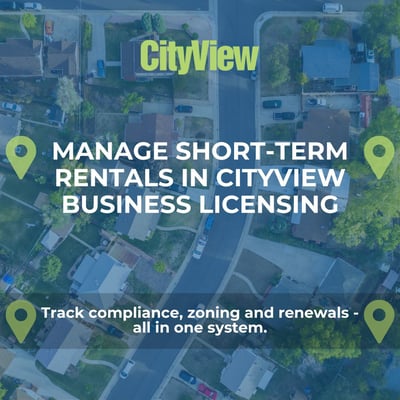November 6, 2025
Short-term rentals (STR) have moved from “home sharing” to a regulated part of local commerce. Municipalities are adopting new bylaws, creating registration programs and requiring proof of compliance before a property can operate as an Airbnb, VRBO or seasonal rental. Oversight has also shifted departments: in many jurisdictions, it now falls under licensing or bylaw enforcement rather than tourism, because STR management is no longer about promotion — it is about safety, zoning, neighborhood impact and revenue transparency.
Many CityView customers already have the tools to manage STR programs. Short-term rental oversight does not require a separate vendor or standalone subscription. It can be configured directly within CityView Business Licensing as a dedicated license type, using the same workflows, renewals, parcel validation and compliance tools you already rely on for other regulated activities.
STR as a license type, not a new system
Purpose-built STR platforms are often positioned as specialized solutions, but in practice they are performing licensing with a property validation step. CityView already provides both in a single platform.
By configuring “Short-Term Rental” as a license type, municipalities can:
- Validate location and zoning using GIS, ensuring properties are permitted in eligible areas
- Request supporting documents such as proof of insurance, ownership verification or emergency contact details
- Require safety inspections, compliance validations or self-certifications
- Control renewals and expirations to prevent noncompliant properties from operating
- Track violations and route them to bylaw or enforcement when needed
- Collect and manage licensing fees and renewal revenue
- Enable property owners to apply, renew and upload documents online through CityView Portal — a system many residents are already familiar with
Because STR lives under Business Licensing, it becomes part of the same regulatory ecosystem as any other commercial license. There are no data silos, no duplicate parcel records and no parallel workflows or logins for staff.
Why this approach is resonating with municipalities
Municipalities that already issue business licenses are finding that they can provide more consistent oversight when STR is handled through the same process. It delivers:
Clarity for staff
Licensing, inspections, enforcement and renewals are managed in one place.
Consistency for applicants
Property owners follow a familiar licensing process instead of learning a separate system.
Better zoning compliance
GIS validation makes location-based rules enforceable from the start.
Visibility across departments
When STR is configured in CityView, planning, building, bylaw and clerks all see the same record. CityView already maintains property history, contact details, inspectors and contractors — all of which can be leveraged to support STR workflows.
Lower technology overhead
No additional platform to maintain, procure or integrate.
This model has been especially effective in Canada, where STR oversight is increasingly managed by planning or bylaw rather than the clerk’s office. Because CityView Business Licensing is already connected to property data and enforcement workflows, it aligns naturally with modern STR program structures.
How configuration works in CityView
Most municipalities can begin managing STR with configuration rather than customization. Typical setup includes:
1. Create “Short-Term Rental” as a license type
2. Define workflow steps, submittal requirements and application details
3. Add optional inspections, departmental reviews or self-certifications
4. Validate zoning and potential property alerts automatically through CityView’s GIS integrations
5. Set renewal schedules, business rules, and communications to your licensees
6. Apply conditions or suspensions if a property becomes noncompliant
This same approach also supports other regulated uses such as cannabis retail or cultivation, which have similar location-based rules and renewal oversight requirements.
A modern approach to licensing emerging businesses
Short-term rentals, cannabis dispensaries, food trucks and other emerging business types all share a common municipal need: the ability to verify eligibility, enforce safety and zoning requirements, collect fees and revoke authorization when conditions are not met. Treating these programs as part of CityView Business Licensing — rather than separate systems — gives municipalities the flexibility to adapt to evolving bylaws without adding more tools for staff to learn or manage.
By keeping specialty licensing inside CityView, jurisdictions maintain a single record of truth for businesses, parcels and compliance activities. It keeps oversight aligned with the departments that enforce it and protects staff from juggling parallel systems as new bylaws emerge.
Interested in enabling STR licensing?
Short-term rental regulations continue to evolve, and in many regions, licensing requirements are expanding. Checking your local or state regulations can help your organization anticipate upcoming mandates and get ahead of compliance — before it becomes urgent.
If your jurisdiction is planning to introduce an STR program, or wants to validate whether your current setup is already STR-ready, contact your CityView representative to discuss options.


